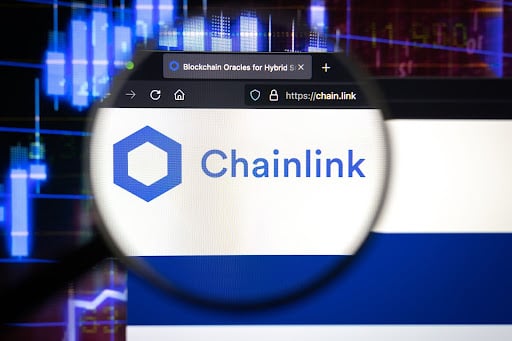- Chainlink’s CCIP is set to revolutionize how banks interact with the blockchain.
- The new protocol offers seamless integration, allowing banks to tap into a global liquidity market for their digital assets.
At the Sibos conference, a leading financial services event, Chainlink co-founder Sergey Nazarov delivered a groundbreaking revelation. Speaking in front of international banking representatives, he unveiled the potential of Chainlink’s Cross-Chain Interoperability Protocol (CCIP) to change the game in digital assets integration for global banks, as highlighted in a tweet by Chainlink Today @ChainlinkToday.
“Any real-world asset, stablecoin, or any other product that goes live on your chains now has access to global liquidity and markets.”
During his #Sibos keynote, @SergeyNazarov explained how #Chainlink CCIP lets banks unlock the future of digital assets. https://t.co/zsTDPKVBTi
— Chainlink Today (@ChainlinkToday) September 18, 2023

At Sibos in Toronto, Nazarov emphasized the profound impact that Chainlink’s CCIP could have on the banking sector. Just as TCP/IP united different systems under one universal internet protocol, CCIP intends to be the bridge connecting various blockchains into a unified internet of contracts. This creates an interconnected global network that drastically enhances the utility of tokenized real-world assets by letting them move seamlessly between private bank chains and public DeFi applications.
“Any real-world asset, stablecoin, or any other product that goes live on your chains now has access to global liquidity and markets,” Nazarov detailed.
With numerous banks opting to create their own chains, Nazarov identified a pressing issue: a lack of connectivity. Without this connection, the liquidity and access to other counterparties with their chains are compromised. It’s a fundamental challenge, and one that Chainlink’s CCIP is poised to address.
Innovations and Enhancements with CCIP
Several innovations are encompassed within CCIP. Notably, it boasts a Risk Management Network tailored to different users, parties, and risk factors. Moreover, its cross-chain messaging system doesn’t only transfer digital assets, but also communicates directives regarding the asset’s utility on the receiving chain.
Nazarov added, “You want to transmit value, but you actually want to also transmit instructions about what the value is about and what the value will be able to do.”
The CCIP’s global messaging standard complements Chainlink Data Feeds. These feeds have securely processed transactions amounting to over $8.5 trillion in value. Coupled with services like Proof of Reserve, it ensures on-chain assets continuously mirror real-world data.
Nazarov further illustrated with an example:
“You can make your tokenized gold coin, but then you need to inject information into it. You need to inject proof of reserves, proving that there is actually gold backing the coin.”
At the core of this, Nazarov emphasizes the creation of a “golden record”. Chainlink’s tools, including CCIP, not only simplify the creation of real-world assets and their cross-chain movements but also ensure the constant updating and maintenance of essential data. After all, in Nazarov’s words, “A golden record needs to stay golden.”
In conclusion, given Chainlink’s innovative strides with CCIP, it’s conceivable that Ripple (XRP) and Litecoin (LTC) might be on the brink of a significant market upswing as they integrate with major banks.
- Invest in Chainlink and 70+ cryptocurrencies and 3,000 other assets.
- 0% commission on stocks – buy in bulk or just a fraction from as little as $10.
- Copy top-performing traders in real time, automatically.
- Regulated by financial authorities including FAC and FINRA.

Get Started
Crypto News Flash does not endorse and is not responsible for or liable for any content, accuracy, quality, advertising, products, or other materials on this page. Readers should do their own research before taking any actions related to cryptocurrencies. Crypto News Flash is not responsible, directly or indirectly, for any damage or loss caused or alleged to be caused by or in connection with the use of or reliance on any content, goods, or services mentioned.
Credit: Source link


![Top NFTs for Sale with High Potential in This Bull Run [2025 List]](https://cryptocentralized.com/wp-content/uploads/2024/11/unnamed-2024-11-25T113320.523-360x180.jpg)






















































































![Top NFTs for Sale with High Potential in This Bull Run [2025 List]](https://cryptocentralized.com/wp-content/uploads/2024/11/unnamed-2024-11-25T113320.523-350x250.jpg)


















































